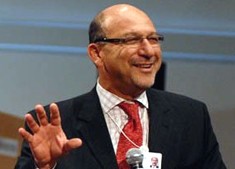Mini-Budget: R15bn for 2010
Shaun Benton
26 October 2006Almost R15-billion of the proposed R80-billion increase in South African government spending over the next three years will go to 2010 Soccer World Cup major capital projects, Finance Minister Trevor Manuel said in his Medium Term Budget speech to Parliament in Cape Town on Wednesday.
According to the Treasury's Medium Term Budget Policy Statement, the balance of R65-billion in proposed additional government spending is targeted mainly at improvements in the criminal justice system, continuing large-scale investments in the built environment, and more investment in human development.
'Fiscal space' for increased spending
On a year-by-year basis, from a budget that proposed R472-billion in spending in February, and taking into account changes from mid-year adjustments, total government spending in the 2006/07 financial year is projected to be R474-billion, up nearly R60-billion - or 14% - over 2005/06, the
minister said.
In 2007/08, expenditure on public services will again increase by about R60-billion.
In real terms, the increase in government spending in the current year compared with the previous year is already 9.7%, while spending over the medium term is projected to grow by an average of 7% in real terms.
This rate of increase in government spending is consistently higher than the rate of growth of South Africa's economy, which reached almost 5% in 2005.
"The reason why we can increase spending so rapidly is that we have created the fiscal space to do so," Manuel said, attributing this fiscal space to "decisions taken consistently" over the past 12 years.
2010 World Cup 'well covered'
The R14.9-billion to be spent on preparations for the 2010 tournament is to be split between the building and/or upgrading of 10 stadiums in the nine host cities, on the one hand, and their surrounding infrastructure, with a special focus
on transport, on the other.
The key imperatives of improved transport and communications infrastructure, with an efficient and affordable public transport system, have been identified as being probably the single greatest legacy that the event will leave the country.
The 2007 Medium Term Expenditure Framework, which ends in March 2010, "will carry the full costs of government's contribution to preparations for the 2010 Fifa World Cup," with Finance Minister Trevor Manuel saying that 2010 was "well covered" by this.
Breaking down the spending, Manuel said that R5.6-billion would go to the building of five new stadiums, R1.95-billion to the upgrading of five existing stadiums, R586-million for the provision of bulk services to these stadiums, and R5.5-billion for supporting infrastructure, including transport.
In addition to this, there will be further spending by municipalities, the minister said.
The R80-billion in proposed new spending has been boosted by increased tax revenues for the Treasury - largely on the back of a rise in VAT receipts as a result of higher consumer spending in a strong economic environment - of a projected R29.6-billion more than the budgeted amount for 2006/07.
The provinces and municipalities are to receive the largest share of the additional resources, with R28.2-billion going to the provinces and R18.9-billion to local government, with the strengthening of public transport infrastructure and construction of stadiums and related infrastructure taking place at this level.
Treasury to assist municipalities
Manuel said the National Treasury would be providing substantial hands-on support to the country's municipalities to meet the targets set for 2010, which is also being used as a deadline for the government to meet overall service delivery requirements that will allow the sporting event to leave a "durable legacy" for South Africans.
"I don't think we are going to see a successful World Cup if it's all hands-off [on the part of national government]," Manuel said.
Aside from the world cup, Manuel's Mini-Budget contains a strong focus on improvements to the criminal justice system, the expansion of the economy using state-owned enterprises, upgrading the skills of educators and improving the government's capacity to meet its targets.
Source: BuaNews










